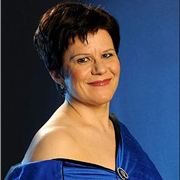IN a Bridgewater Hall concert that includes Richard Strauss’s most famous tone poem, Also Sprach Zarathustra, and perhaps his most engaging non-operatic work, Don Quixote, you’d be excused for regarding Three Hymns, just before the interval, as a lean filler in a lush musical sandwich.
The finale, when our hero’s wits are restored but death looms, offers a rare poignancy – Isserlis intensely involved in the long stretched out melody.
But, of course, it is exactly what the fascinating Strauss’s Voice festival is all about combining such iconic instrumental voyages with exploring the backwaters of lesser known vocal works. He wrote 200 songs in all, particularly suited to the female voice – his wife was a singer. Asking her to attempt the fiendishly difficult Hymns, though, may have put as much a strain on their relationship as on her vocal chords.
 Soile IsokosiFortunately the BBC Philharmonic under the baton of Juanjo Mena, had enlisted a soprano well up to the task, Soile Isokosi. The Finn is an experienced Straussian – she’s a regular Marschallin in Der Rosenkavalier and has recorded the Three Hymns, which are based on the lyrics of Friedrich Holderlin.
Soile IsokosiFortunately the BBC Philharmonic under the baton of Juanjo Mena, had enlisted a soprano well up to the task, Soile Isokosi. The Finn is an experienced Straussian – she’s a regular Marschallin in Der Rosenkavalier and has recorded the Three Hymns, which are based on the lyrics of Friedrich Holderlin.Particularly in Return To The Homeland, the middle and least hymnlike Hymn, she unleashed a passionate intensity. Written a quarter of a century before the Four Last Songs, which get three separate performances here in February, they deserve this rare outing.
Zarathustra shares the same longing for transcendence, but after the epic Sunrise opening – Stanley Kubrick borrowed it for 2001 A Space Odyssey – it gradually loses any Nietzschean gravitas and, settles for Late Romantic swirl. All great fun for the Phil, especially the skittish violin solo in the Tanzlied section, but as a work emotionally stalled.
Redemption comes with the evening’s concluding piece, the sublime Don Quixote: Fantastic Variations On A Theme Of A Knightly Character – which gives you exactly what it says on the packet.
Cellist Steven Isserlis – last seen at the Bridgewater during MIF helping celebrate the genius of John Tavener – is riveting in his absorption in the character of the Don as he loses his grasp on reality. He is shown in action in the main picture at the top of the page.
Tilting with windmills, mistaking a flock of sheep for an army, seeking the love of his beloved Dulcinea, all realised in this set of 'fantastic variations'.
None more fantastic than Variation 6, which recreates Cervantes’ greta creation sitting blindfold on a toy horse, convince he is riding to aid a damsel in distress. This involved a harp, flutes and all hands to the pumps on the wind machines for the percussion section, all the while Isserlis sawing his cello and shaking his shaggy grey curls.
It’s the original buddy road-trip, of course, with Quixote’s ally, his earthbound servant Sancho Panza, given musical shape superbly by BBC Phil principal viola Steven Burnard. Particularly moving is Variation 5 when the wannabe knight holds a vigil over his rusty armour and the slumbering Sancho. The finale, when our hero’s wits are restored but death looms, offers a rare poignancy – Isserlis intensely involved in the long stretched out melody. Quiet flows the Don. An heroic musical voyage.
Strauss’s Voice, until March 8 2014. At the Bridgewater Hall, Lower Mosley Street, Manchester, M2 3WS.
Tickets are £10-£38 and can be booked at www.bridgewater-hall.co.uk.
For full details of all concerts and other events visit www.straussvoice.com.














